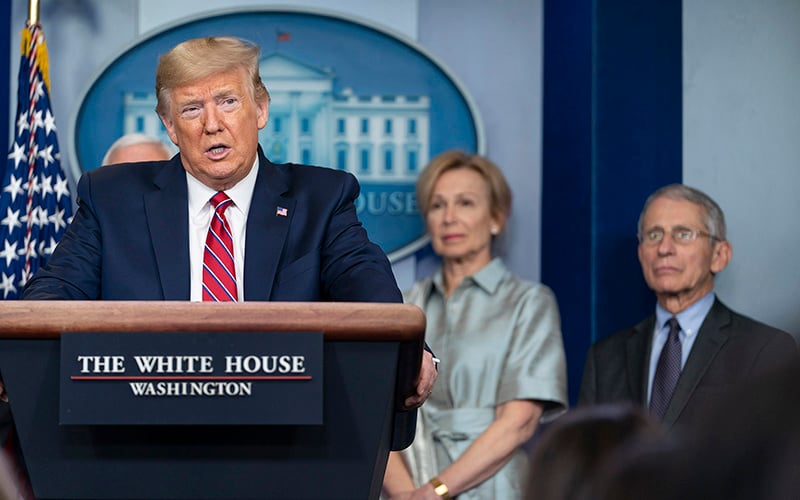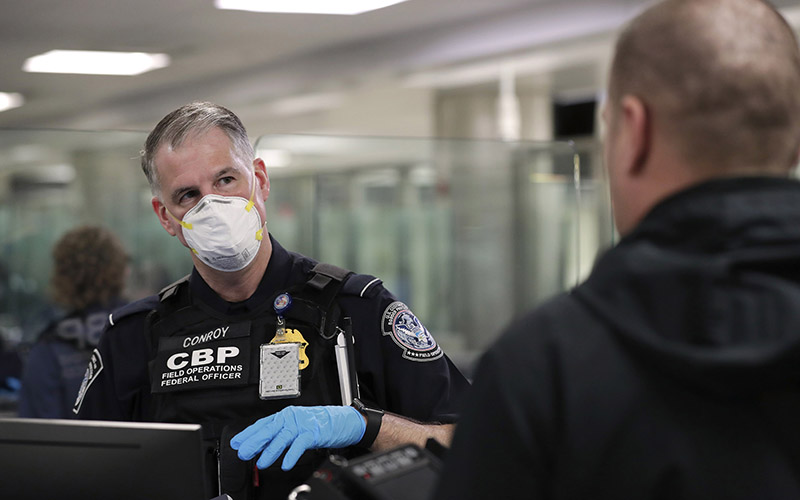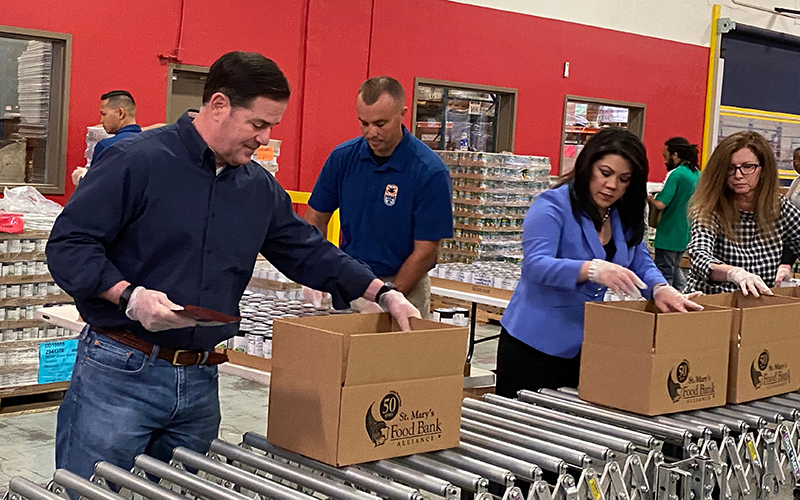
President Donald Trump speaks during a White House press conference of the coronavirus task force, where officials talked about restrictions on Mexico border traffic and a new plan to repatriate undocumented migrants as responses to the disease. (Photo by Shealah Craighead/ The White House)
WASHINGTON – The U.S. and Mexico will stop all “nonessential” border crossings after midnight Friday in an effort to contain the spread of the coronavirus, but goods and essential workers will still be allowed to cross, the White House announced Friday.
The action comes just days after similar restrictions between the U.S. and Canada and mirrors that agreement, which is also set to take effect at 12:01 a.m. Saturday.
Arizona officials and border business leaders said the new rule will have an impact on tourists and shoppers from the two countries, but they did not seem overly concerned that it would do serious damage to their economies because of the exemption on cross-border trade.
But that does not mean that people in border communities were not concerned about the change Friday. Nogales Chamber of Commerce President Olivia Ainza-Kramer said her office saw a high number of calls from citizens with work concerns.
“There are some people that live in Mexico and work in the states, and employers are calling to know what requirements they are going to have for employees to come back and work,” Ainza-Kramer said. Early indications, she said, are that workers will be OK.
“By the communication we have received, it is those tourists who come across to do grocery shopping, those people are not going to be coming,” she said.
The announcement came Friday at a news conference of the White House coronavirus task force, where President Donald Trump also announced that the Department of Homeland Security would begin sending undocumented migrants and asylum seekers back to their home countries.
Both measures take effect after midnight Friday and both were framed as responses to the continued spread of the coronavirus.
“Today’s announcement is yet another example of the extraordinary steps the administration is taking to ensure the safety of the American public,” said Acting Homeland Security Acting Secretary Chad Wolf at the event.
“Let me be clear, neither of these agreements with Canada or Mexico applies to lawful trade or commerce,” Wolf said. “Essential commercial activities will not be impacted.”
That was echoed Friday by Arizona Gov. Doug Ducey. He was asked about the new border restrictions during a news conference at the St. Mary’s Food Bank where he was talking about state measures to cope with the crisis, including closing bars and eat-in restaurants in coronavirus-affected counties and calling out the National Guard to help resupply stores in the state.
“The border has not been closed. The border remains open for trade and essential services,” said Ducey, adding that the restrictions at the northern and southern borders were necessary precautions to prevent the spread of COVID-19.
“In terms of tourism, those types of elective decisions, that’s all been stopped at this time,” he said.
But even with essential trade unaffected, Arizona Trucker’s Association President Tony Bradley said a lot has changed recently for companies that do business across the border – including trying to determine what is essential business and what is not.
“Nothing is business as usual,” Bradley said. “Yesterday, I was driving down the road and saw one of our member companies who normally services the mining industry. That truck was carrying a refrigeration unit for Safeway.
“So we are trying to make adjustments in our society, company by company, to help service what the needs of the American people are.”
In Yuma, many farmers go about their daily lives “as if there is no border,” said John Courtis, executive director of the Yuma County Chamber of Commerce. But Yuma’s thriving “medical tourism” traffic – with residents heading across the border to Los Algodones, where medicine and medical care are cheaper – is likely to take a hit from the new restrictions.
“There’s 1,000 dentists in Los Algodones, just due west of Yuma. So I think all of those folks waiting in line to get dental work done will be sent away,” Courtis said.
“Prescription drugs are about 20% of American prices,” he said. “There is more of a risk, but some people say, ‘For an 80% discount, I’ll take that!'”


